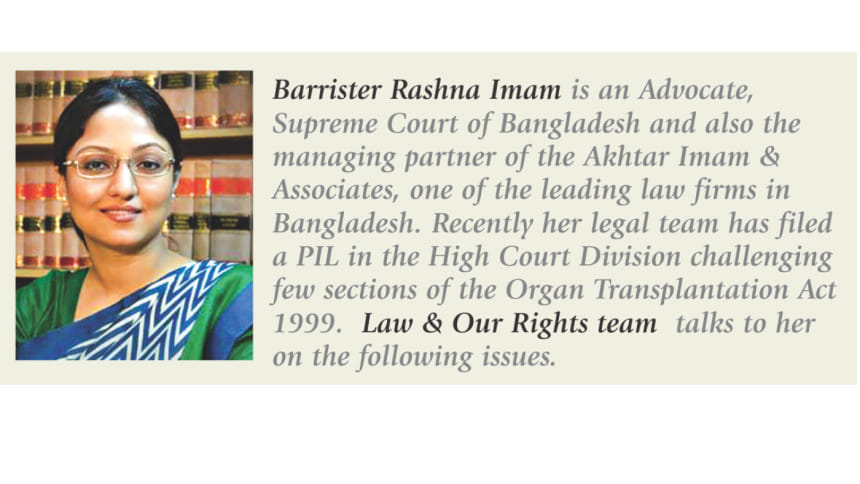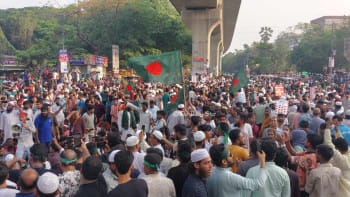“A judicial intervention had to be sought”

Law Desk (LD): Recently you have filed a Public Interest Litigation (PIL) in the High Court Division challenging some sections of the Organ Transplantation Act 1999. Would you please elaborate on it? What factors basically made you do this?
Rashna Imam (RI): We have challenged the constitutionality of sections 2 (ga), 3 and 6 of the Organ Transplantation Act 1999 and the failure of the State to effectively implement the Act, despite the lapse of 17 long years, by framing rules and regulations. We have also sought guidelines from the court for organ donation and transplantation.
In Bangladesh, at least 20 million people suffer from kidney diseases. 35,000 to 45,000 of them die of kidney failure every year. Kidney transplant being a much more superior form of treatment (both, economically and medically) than dialysis, the annual demand for kidney transplant is estimated to be between 5,000 to 9,000. Unfortunately, only 120 to 130 persons get kidneys for transplant.
The unreasonably restrictive definition of donors in section 2(ga), 3 & 6 of the Act is adding more to the problem and thus is directly causing deaths of many and fuelling the already flourishing illicit kidney trade as well. Therefore, a judicial intervention had to be sought.
LD: Why do you think that the definition of 'donors' in the 1999 Act directly affects the constitutionally guaranteed fundamental right to life?
RI: Article 32 of the Constitution provides that no person shall be deprived of life or personal liberty save in accordance with law. Article 15(a) provides that it is a fundamental responsibility of the state to provide for the basic necessities of life, including, among others, medical care. Article 18 provides that it is a primary duty of the State to improve public health.
Sections 3 read with 2(ga) and 6(1) of the Act provide a very narrow definition of donors. Only “near relatives” can be donors. “Near relative” have been defined to include son, daughter, father, mother, sister, brother, husband, wife and uncles and aunts who are related by blood. This definition has to be expanded to include at least grandfather, grandmother, grandson, granddaughter and first cousins. Further, a provision must be made for exceptional circumstances when a donor can be someone from outside this group. “Exceptional circumstances” must be defined and/or criteria must be laid down for its determination. There is also some room for expanding the age range for donors. In this regard India has amended its laws, rules and regulations to address this issue that can be taken into account.
LD: Why do you think that the present legal framework concerning organ transplantation is somehow to be blamed for fuelling the present illicit kidney trade?
RI: There is no proper legal framework in Bangladesh to deal with organ donation and transplantation. The Act, though enacted in response to incidents of abuse, contains an unreasonably narrow definition of donors and is fraught with inadequacies which defeat the very purpose for which it was enacted. Furthermore, there are no rules and regulations to ensure its effective implementation.
According to Washington based GFI, many in Bangladesh, particularly the poor and uneducated in the rural areas, are compelled to sell their organs primarily to settle debts or for financial respite. The brokers downplay the risk of future complications and sometimes the doctors even tell potential vendors that their kidneys will grow back. The restrictive Act and the lack of rules and regulations thus is fuelling this already flourishing illegal kidney trade.
LD: What are the major flaws in the 1999 Act?
RI: The major flaws include, as I have already mentioned, the narrow definition of “near relative”, absence of a provision for “exceptional circumstances” in which the donor can be from outside this group, the restrictive age limit for donors and the unfettered power of the medical board to decide whether a donor or recipient is qualified to donate or receive. Besides, the Act needs to provide for an authorisation committee whose primary function will be to verify the relationship between the donor and the recipient, guidelines as to how the committee will conduct such verification, a Cadaveric Organ Donation Committee to regulate cadaveric organ donation and a central authority similar to the Human Tissue Authority in the UK, to regulate this area, maintain a central register of donors and recipients, provide training and certification to hospitals, clinics, doctors and other medical technicians, etc.
LD: Despite receiving an order from the HCD in 2011 for framing rules to enforce the Organ Transplantation Act 1999 more effectively, why is the Government yet to comply with such order?
RI: Only the government is in a position to answer that question. Successive governments have failed to frame rules and regulations to flesh out the Act and ensure its effective implementation. Suffice it to say that the legislature and executive having failed to deliver, a judicial intervention had to be sought in the form of declaration of unconstitutionality of the law and through formulation of guidelines to fill the void till suitable legislative amendments are made.
LD: What do you look forward to this legal battle/PIL?
RI: I would not call it a battle. We expect full co-operation from the AG's office in reaching a common goal which is a comprehensive set of guidelines from the High Court until suitable legislative amendments are made. Indeed the AG's office has been very cooperative till date. It is imperative that the guidelines/legislation will be able to ensure adequate availability of kidneys at the same time will contain enough safeguards for preventing abuse. This will save thousands of life on a yearly basis and significantly minimise the need to go abroad for a simple procedure like kidney transplant.
LD: Thank you for the time.
RI : You are welcome. b

 For all latest news, follow The Daily Star's Google News channel.
For all latest news, follow The Daily Star's Google News channel. 



Comments